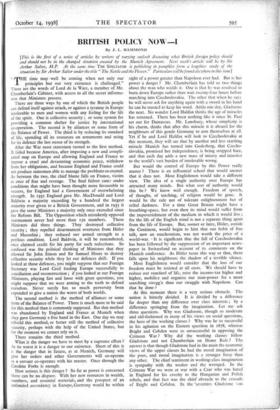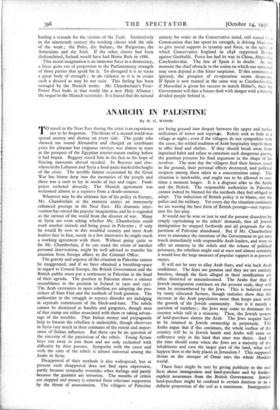BRITISH POLICY NOW -I
By J. L. HAMMOND
[This is the first of a series of articles by writers of varying outlook discussing what British foreign policy should and should not be in the changed situation created by the Munich Agreement. Next week's article will be by Sir Arthur Salter, M.P. At the same time THE SPECTATOR is publishing in pamphlet form a lengthier study of the situation by Sir Arthur Salter under the title " The Nettle and the Flower." Particulars will be found elsewhere in this issue] "THE time may well be coming when not only our principles but our very existence is challenged." These are the words of Lord de la Warr, a member of Mr. Chamberlain's Cabinet, with access to all the secret informa- tion that Ministers possess.
There are three ways by one of which the British people can defend itself against attack, or against a tyranny in Europe intolerable to men and women with any feeling for the life of the spirit. One is collective security ; or some system for providing a common shelter for justice by international co-operation. The second is by alliances or some form of the Balance of Power. The third is by reducing its standard of life, spending all its resources on armaments and using for its defence the last ounce of its strength.
After the War most statesmen turned to the first method. It failed because America, after imposing a new and compli- cated map on Europe and allowing England and France to impose a cruel and devastating economic peace, withdrew from her obligations, and because England and France could not produce statesmen able to manage the problems so created.
As between the two, the chief blame falls on France, victim at once of fear and revenge. The final failure came under conditions that might have been thought more favourable to success, for England had a Government of overwhelming strength. In 1931 England gave Mr. MacDonald and Lord Baldwin a majority exceeding by a hundred the largest majority ever given to a British Government, and in 1935 it gave the same Ministers a majority only once exceeded since the Reform Bill. The Opposition which mistakenly opposed rearmament never had more than 15o members. These Ministers did three things. They destroyed collective security ; they repelled disarmament overtures from Hitler and Mussolini ; they reduced our armed strength to a perilous condition. Lord Baldwin, it will be remembered, once claimed credit for his party for such reductions. So confused was the political thinking of Ministers that they allowed Sir John Simon and Sir Samuel Hoare to destroy collective security while they let our defences drift. If you looked at those defences, you might suppose that our Foreign Secretary was Lord Cecil leading Europe successfully to conciliation and reconstruction ; if you looked at our Foreign Ministers, playing fast and loose with great questions, you might suppose that we were arming to the teeth to defend ourselves. Never surely has so much perversity been expended to give a nation the worst of both worlds.
The second method is the method of alliances or some form of the Balance of Power. There is much more to be said for this method than is commonly supposed. But that method was abandoned by England and France at Munich when they gave Germany a free hand in the East. One day we may rebuild this method, or better still the method of collective security, perhaps with the help of the United States, but for the moment we cannot rely on it.
There remains the third method. % What is the danger we have to meet by a supreme effort ? At its worst it is a danger to our existence. Short-of this it is the clapger that in future, as at Munich, Germany will give her orders and other Governments will co-operate as a servant co-operates with his master. Once through the Caudine Forks is enough.
How serious is this danger ? So far as power is concerned there can be no dispute. With her new resources in wealth, numbers, and essential materials, and the prospect of an unlimited ascendancy in Europe, Germany would be within sight of a power greater than Napoleon ever had. But is her power a danger ? Mr. Chamberlain has told us two things about the man who wields it. One is that he was resolved to burn down Europe rather than wait twenty-four hours before marching into Czechoslovakia. The other that when he says he will never ask for anything again with a sword in his hand he can be trusted to keep his word. Attila one day, Gladstone the next. No wonder Lord Halifax thinks the age of miracles has returned. There has been nothing like it since St. Paul set out for Damascus. Mr. Lansbury, whose simplicity is his charm, thinks that after this miracle it is absurd for the neighbours of this gentle Germany to arm themselves at all. Yet if he and Lord Halifax will look to Czechoslovakia at this moment, they will see that by another and less startling miracle Munich has turned into Godesberg, that Czecho- slovakia, promised her independence, is being stripped bare, and that each day adds a new mass of misery and injustice to the world's vast burden of intolerable wrong.
But would the control of Europe by this Power really matter ? There is an influential school that would answer that it does not. Most Englishmen would take a different view. The idea of a single authority over Europe has attracted many minds. But what sort of authority would this be ? We know well enough. Freedom of speech, of thought, of teaching, of religion would be gone. It would be the rule not of tolerant enlightenment but of tribal darkness. For a time Great Britain might have a breathing-space, but even then its mind would suffer from the impoverishment of the medium in which it would live ; for the life of the English mind is not a separate thing apart from the life of Europe. But, sooner or later, Hitler, astride the Continent, would begin to hint that our habit of free talk, now an anachronism, was not worth the price of a world-war. • It is significant that the fall of Czechoslovakia has been followed by the suppression of an important news- paper in Switzerland on account of its comments on the Munich conference. As Hitler turns this way or that, there falls upon his neighbours the shadow of a terrible silence.
Most Englishmen would consider that the loss of our freedom must be resisted at all costs. We should have to reduce our standard of life, raise the income-tax higher and higher, mobilise and organise our man-power for a more searching struggle than our struggle with Napoleon. Can that be done ?
At this moment there is a very serious obstacle. The nation is bitterly divided. It is divided by a difference far deeper than any difference over class interests ; by a difference springing from the imagination. Let me ask three questions. Why was Gladstone, though so moderate and old-fashioned in many of his views on social questions, the hero of the working classes ? Why was he so successful in his agitation on the Eastern question in 1878, whereas Bright and Cobden were so unsuccessful in opposing the Crimean War ? Why did the working classes follow Gladstone and not Chamberlain on Home Rule ? The answer is that though Gladstone had in the main the economic views of the upper classes he had the moral imagination of the poor, and moral imagination is a stronger force than any other. The chief sentiment in working-class imagination is sympathy with the weaker and the wronged. In the Crimean War we were at war with a Czar who was hated in England for his cruelty to the Hungarian and Polish rebels, and that fact was the chief obstacle to the crusade of Bright and Cobden. In the 'seventies Gladstone •ilas leading a crusade for the victims of the Turk. Instinctively in the nineteenth century the working classes took the side of the weak ; the Poles, the Italians, the Bulgarians, the Armenians and the Irish. If the other. classes had been disfranchised, Ireland would have had Home Rule in 1886.
This moral imagination is an immense force in a democracy, a force quite out of proportion to the Parliamentary strength of those parties that speak for it. To disregard it is to waste a great body of strength ; to do violence to it is to create such a discord as may be our ruin. This feeling has been outraged by the Munich terms. Mr. Chamberlain's Four- Power Pact looks in that world like a new Holy Alliance : the sequel to the Munich surrender. It is feared that the natural anxiety for order in the Conservative mind, still scared a Communism that has spenr'its strength, is driving Ministers to give moral support to tyranny and force, in the spirit in which Conservative England in 1848 supported Bomba against Garibaldi. Force has had its way in China, Abyssinia, Czechoslovakia. The fate of Spain is in doubt. At this moment the chief obstacle to the union on which our existence may soon depend is this bitter suspicion. If this sentiment is ignored, the Prospect of co-operation seems desperate. If Spain is now treated in the same way as Czechoslovakia, if Mussolini is given his success to match Hitler's, then the Government will face a future dark with danger with a bitterly divided people behind it.



















































 Previous page
Previous page